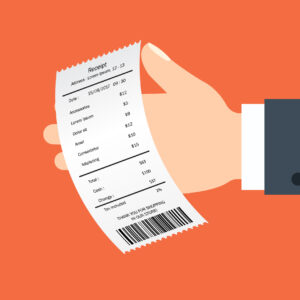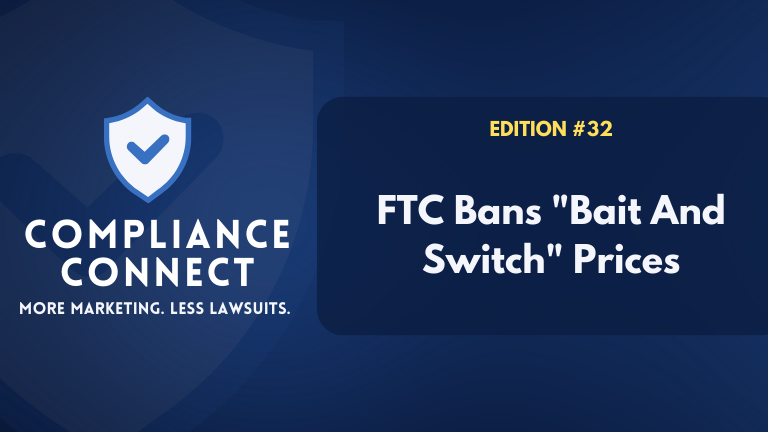Good morning! This is the thirty-second edition of the Compliance Connect newsletter.
The goal is simple: to keep you in the loop on what the FTC and other regulatory agencies are up to so that you can protect yourself.
We have an altered schedule for the end of the year…
- December 23: This edition
- December 30: Special year in review edition
- January 6: Normal schedule resumes (Mondays and Thursdays)
Remember: this is NOT legal advice, only information!
Here’s the rundown today…
- 🚫 FTC Targets “Junk Fees”
- 🤔 What The New Rules Mean
- 🛒 New Lawsuit Accuses Amazon Of Deceptive Pricing
- 💵 What Does An Investigation Really Cost?
- ✨ The Youngest FTC Chair
Compliance Digest: What You Should Read Today
FTC Finalizes New Rule Banning Bait And Switch Pricing
The Federal Trade Commission (FTC) has finalized a rule requiring businesses to disclose the total price which includes all fees.
We’ll break this new rule down later in this edition.
The rule, approved in a 4-to-1 vote, will take effect in 120 days and is expected to save consumers significant time by making pricing more transparent.
This ruling aligns with broader efforts to increase price transparency in the ticketing industry, sparked in part by issues like the Taylor Swift Eras Tour ticket controversy.
While the rule mandates clear advertising of all-in pricing, it does NOT cap the fees businesses can charge.
Another note is that incoming chair Andrew Ferguson voted against the new rule, although he didn’t disagree with it on the merits.
Amazon Sued for ‘Fake Discounts’
Amazon is facing a lawsuit alleging that it used misleading pricing practices during the holiday shopping season.
The lawsuit claims that Amazon’s “list prices” were inflated to make products, including Amazon Fire TVs, appear discounted when they were not.
It further alleges that prices were temporarily raised to match the list price before being lowered again, creating the impression of a sale.
Filed by a customer named David Ramirez, the lawsuit could potentially become a class action, allowing others who made similar purchases to participate.
If the claims are proven, it may lead to changes in how Amazon displays prices and advertises discounts.
Here is the complaint.

The Monetary Costs Of Investigations
Most people don’t know what it truly costs to be investigated by a regulator.
They see headlines like “Grubhub settles for $25 million with the FTC” or “Home Depot settles for $2 million with California district attorneys” and think that’s the amount the investigation cost them.
In reality those headline figures aren’t anywhere close to how much those lawsuits cost the company.
The financial cost of being investigated can be grouped into the following categories:
- The Lawyers
- The Discovery
- The Fine
- The Opportunity Cost
Each one of these is substantial. You have to figure in all of these in order to get the whole picture, not just the amount you see in the headlines.
Cost of Lawyers
You’re going to have to hire a law firm.
If you hire a smaller law firm, the investigation could cost you between $100,000 to $500,000.
If you opt for a larger law firm, you will be paying a minimum of $500,000, and even as high as $2 Million in during the investigation, and that’s just legal fees.
There are benefits to having a larger firm, and there are benefits to having a smaller firm.
Cost of Discovery
The discovery has two main costs to it:
1. The team members that do the document collection.
2. The forensics companies that pull the required data.
Regulators are THOROUGH. They want to look at every nook and cranny of your business to discover potential violations. We’re talking about…
- Financial records
- Customer data
- Past advertising campaigns
- All versions of every advertisement
- All past landing pages
- Copies of all customer complaints
- Every single refund request and response
- Every sales call
- All contracts ever signed
- List of all partners and anyone paid by the company
- Copies of all legal issues and settlements
- All merchant statements
- A copy of every communication within the company (Email, slack, text, etc.)
- CRM access
The list is so extensive that one person on their own could NEVER do it.
You will likely need to get full time team members involved – distracting them from growing your business while still paying their salaries.
Next, in comes the forensics companies. Regulators often want to see all internal communications between all employees.
You might need to pull EVERY Email, every Slack communication, every Skype conversation. Often this has to be done by professionals, who charge an arm and a leg.
That’s why discovery could cost over $1 million.
Cost Of The Fine
In the end, you will probably need to pay a fine.
With the FTC for example, you can’t really negotiate the “judgement” – what they claim you owe. However, you can lean on something called “ability to pay.”
In order to qualify under this clause, you need to agree to revealing all your financials, every penny, every collectible, every trust, every property, every crypto, all of it.
Based on what you have that is “available relatively quickly,” they will determine what you can pay at that time.
If it’s liquid, it goes into the calculation, and their goal is to take a substantial amount of that figure.
The Opportunity Cost
The loss of business opportunity is likely the highest cost that very few people even consider.
An investigation is a MASSIVE distraction. You aren’t able to focus on growing your business.
In addition, you might miss out on some deals.
That comes from the distraction of an investigation, plus the fact that partners might want to avoid working with a company under investigation.
The opportunity cost might be higher than all of the other costs we’ve discussed so far.
Did You Know…
When Lina Khan was confirmed in 2021, she was the youngest FTC chair in history at the age of 32.

What Does The New FTC Rule On “Junk Fees” Do?
Most of us have had the experience of buying tickets to an event or a short term rental and seen the listed price skyrocket at checkout due to a bunch of “convenience fees” that we can’t opt out of.
The FTC introduced a new rule to address this.
It applies to ANY business that charges fees or recurring payments…
- Live events
- Short term lodging
- Subscription services
- Online platforms
The rule prohibits companies from…
- Listing a price and then adding a bunch of mandatory fees at checkout
- Presenting unclear terms in their transactions
Businesses are required to…
- Disclose all fees upfront and explain their nature, purpose, identity, and amount
- Display the full price more prominently than other prices
- Provide clear and simple cancellation options
- Ensure their terms are easy for consumers to understand
Here is a handy infographic the FTC created explaining the rule.
